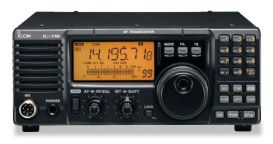Contests
Contesting is a popular activity amongst many radio amateurs. Various contests are held throughout the year, with the aim of promoting communications using a particular mode or band, or with a specific group of amateurs. The usual aim of a contest is to make contact with as many stations as possible, in the allocated time. Some contests attract thousands of hams from all over the world, all trying to log brief contacts with each other. The amateur bands can sound like bedlam on a popular international contest weekend. Most major contests run for 24 or 48 hours. However some include sections which allow the operator to operate for a shorter time.
In some contests, groups of amateurs to work together from their club station, each using a different band. This would be a multi-operator contest station. Most contests have sections for multi-operator stations.
There are also contest weekends when amateurs are required to operate "in the field", as practice for a real emergency. This gives them the experience of using power from alternators, batteries or other sources. To encourage innovation and reward lower powered stations, some contests have separate categories for different types of power, as well as separate categories for single-operator and multi-operator stations.
Unlike sporting competitions, where you need to lodge and entry in advance and pay a fee, you can participate in a radio contest without "entering" it. You just make short, quick contacts, exchanging signal reports and a cipher such as a serial number, your output power or a geographical code.
Australian amateurs participate in international, national and local contests. Most national and international contests are run by national amateur radio societies, such as the WIA. Rules and results are published in magazines such as Amateur Radio. Clubs and special interest groups run their own contests. Amateurs have a huge variety from which to choose. The CW Operators QRP Club runs one-hour long CW 'scrambles' on various HF bands. A New South Wales club offers a 'CQ Repeater' event for contacts via repeaters. Melbourne's Moorabbin & District Radio Club organises an event called Radio on Rails, which promotes activity from trains and trams around Melbourne. Then there are non-contest activity days, such as the Jamboree of the Air and the Lighthouse Weekend.
And what if you're "not in the contest"? Recall the comparison with a sporting competition above. In the case of radio contests there is no formal entry process before the contest. You can join in as a participant, at no notice and with no obligation to make any number of contacts. It is up to you to decide whether you want to join in the fun. So if you hear stations wanting contacts in a contest, don't hold back, give them a quick contact. They will be grateful.
Next: SAREX

